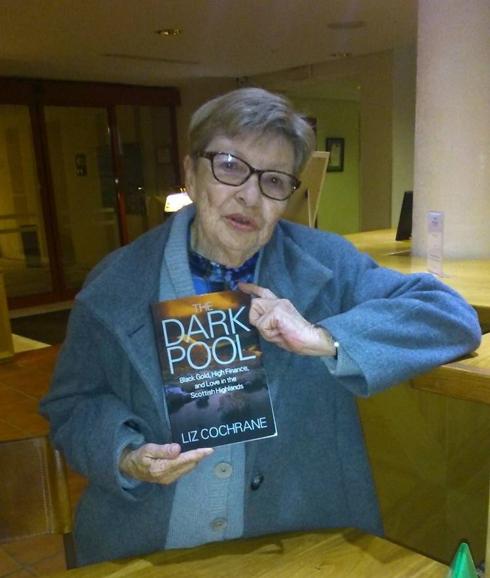

Secciones
Servicios
Destacamos

Tony Bryant
Monday, 25 March 2019, 12:50
Art historian and novelist, Liz Cochrane, first encountered Spain on a road trip she undertook in 1959, and this was to be the start of a long affection for a country that she would eventually call home. At an age when many might be considering retirement in order to enjoy life on the Costa del Sol, Liz, who speaks Spanish and French (her maternal grandmother's language), keeps herself busy giving well-attended talks about art. She has also lectured in Spanish on 15th century illustrated medieval manuscripts to an invited audience in the French Embassy in Madrid, which she describes as "a highlight in my lecturing career".
Born and educated in Glasgow, Liz became head teacher of a remote school in the Scottish Highlands. Her main academic interests were Modern Languages (French and Spanish) and Art - especially the history of art. She settled on a career in teaching and even though she says it was a job she loved, she took early retirement and moved to the Costa del Sol in 1991. Liz settled in Mijas, where she has written two novels - although neither is concerned with art or Spain.
Her love affair with Spain began in the late 1950s, when she travelled from Scotland to Spain in a van, stopping in Madrid, before exploring the east coast (Costa Blanca and Costa Brava), which at that time was a succession of small fishing villages and empty beaches.
"I had a secondhand Thames van and after taking the ferry across the Channel, I drove across France and north Spain, staying overnight on campsites. Every small town had one, and they were very popular with people like teachers who had long holidays but were short of money," the jovial Glaswegian explains.
This was an experience that Liz remembers with fondness, although she admits that she caused some intrigue among the locals she encountered along the way
"What I liked most was the friendliness and helpfulness of the people. I spoke pretty good high school Spanish by that time, and people were curious, but also interested in talking to such an exotic creature - a young woman who could drive a van of her own and had an apparatus called a camera," Liz recalls.
Lifelong affection for the Tour de France
Today, Liz enjoys giving lectures at two U3A centres (Fuengirola and Alhaurín El Grande) and continues to follow the Tour de France, a sport she has studied for more than 60 years and which became the content of her first novel, Legs. The book is based on the final week of a Tour de France and the narrative is held together by the commentaries of Jo Bonnard, a young woman who has fought her way to the top of a male-dominated profession. Liz wrote the novel after a friend asked what attracted her to cycle racing.
"The book was my explanation and the friend subsequently became an avid Tour de France watcher. With increasing age, I tend to watch via the TV screen, but during many years of my youth, I spent much of every summer holiday cheering on the roadsides of France, and later in Spain as well, talking to cyclists and a well-known commentator from whom I learned a great deal. I created a character who is a TV commentator - a woman in what is still a man's world," Liz explains.
Liz came into contact the U3A in Fuengirola in 1998 and since then, she has used her expertise and knowledge to give regular talks on the history of art.
"I read, probably in Sur in English, that U3A was hoping to start a branch in Fuengirola, and the organisers were looking for volunteers willing to share their knowledge of their special interest. I went along and liked the sound of the U3A ethic," the art historian says.
For her second novel, The Dark Pool, Liz used her knowledge of small remote Scottish villages. The book supposes an oil discovery on the Scottish mainland and underlines how small, remote communities are terribly vulnerable to any social change.
Liz has always enjoyed historical research, but she admits that her days of writing novels could possibly have come to an end. However, she has no intentions of giving up her lectures, which have attracted a steady flow of students over the years, some of whom have become personal friends of the passionate art specialist.
"I'm not thinking about retiring again just yet, although I doubt if I would write another book unless I had a publisher's contract first. All those hours at the keyboard and the effort required for marketing; I guess I'm too old now," Liz concludes.
Publicidad
Publicidad
Publicidad
Publicidad
Esta funcionalidad es exclusiva para registrados.
Reporta un error en esta noticia

Debido a un error no hemos podido dar de alta tu suscripción.
Por favor, ponte en contacto con Atención al Cliente.

¡Bienvenido a SURINENGLISH!

Tu suscripción con Google se ha realizado correctamente, pero ya tenías otra suscripción activa en SURINENGLISH.
Déjanos tus datos y nos pondremos en contacto contigo para analizar tu caso

¡Tu suscripción con Google se ha realizado correctamente!
La compra se ha asociado al siguiente email
Comentar es una ventaja exclusiva para registrados
¿Ya eres registrado?
Inicia sesiónNecesitas ser suscriptor para poder votar.